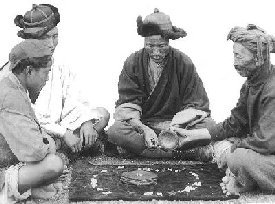

|
We had to take quinine pills against malaria. In the evenings we wore long trousers and long-sleeved shirts, which were not a 100% guarantee against mosquito bites. Once when I became ill, I was rushed to a makeshift hospital where the doctor first thought I had malaria. Fortunately, it turned out to be nothing serious. The hospital was located in Kharagpur, in a Maharajah's palace. It was so overcrowded that my bed was in a tent on the palace grounds. I was told to take a bath, which meant washing in a bamboo enclosure. Medical attention was lacking. For example, I fainted while taking the bath and it went completely unnoticed. Bathing in a bamboo enclosure was far better than bathing just outside our hut with no privacy whatsoever, which is what we were doing when we first arrived in Salbani, with people, male and female, young and old, walking all around. We were the only ones who were embarrassed by all this. At regular intervals we were granted leave and most of the time we went to Darjeeling, a resort town in the Himalayas. The temperature there was much cooler and it was restful. As usual, social activities were limited, places were strictly divided by rank, (officers and non-commissioned officers). Darjeeling was, and still is, famous for its tea and I actually saw a tea plantation. I spent some time in Calcutta which was, and still is, a very large and unappealing city. I would always avoid it whenever possible. My last flight over Burma was on 22 January 1944. The target was Meiktila, not far south of Mandalay. There was nothing spectacular about this trip, which was my 28th "op." I was also not aware that it was to be my last one. On 30 January 1944 I was posted to AFTU at Armarda Road on a bombing leader's course, to learn more about armaments, how to load bombs on aircraft, etc. I do not remember what the AF stood for. Armarda Road was just south of Salbani. On 1 November 1943 I had been promoted pilot officer. It was months before I was notified of this, however, and it was not too long afterwards, on 1 May 1944, that I was promoted flying officer. As an officer, my military number was J85745. It was nice to be promoted but I really enjoyed the rank of warrant officer better than the rank of a commissioned officer. As a warrant officer you are the "highest of the lowest," and you are never bothered with minor duties. As the junior officer in the Officers Mess, because you are the "lowest of the highest," you are often assigned many petty duties, such as library officer, duty officer, and other menial tasks. |
 Rickshaw wallahs (taxi drivers ?), Darjeelings I received $700 in back pay and with great difficulty I had it transferred via a bank in Bangalore to my account in Yarmouth, Nova Scotia. The problem was caused by India's currency regulations, but I managed to convince the bank in Bangalore by making up a story that the money involved should never have left Canada but should have gone directly to my account in Yarmouth. Soon after my bombing leader's course, I was posted to 1673 Heavy Conversion Unit, which was in the process of being formed in Salbani. On 3 March the unit was transferred to a new base which was opening in Kolar, near Bangalore, in southern India. On the flight to Kolar I acted as second pilot, as well as navigator, on a Liberator aircraft. The climate in the south of India is very pleasant all year. There is no monsoon period. Although Kolar was a new base lacking many commodities, overall it was acceptable. I was the bombing leader and, as such, I was also the instructor in charge of the bombing course. This new job did not include very much flying time. At this time the Allies were winning the war in Europe and more emphasis was being placed on the Burma campaign. Crews were arriving from Canada, flying new Liberators. The number of Canadians on the base increased from month to month and among the new arrivals were Hugh MacPherson and Creighton Jewkes, both from Antigonish, Nova Scotia. I still meet them occasionally. A few times we even had enough Canadians to organize a softball game. All the instructors in this unit were veterans of the Burma campaign and it was our job to teach the new arrivals about the war in Burma, airplanes, flying conditions, climate, targets, and social life.
One of the popular resorts in southern India was Ootacamund, not too far southwest of Bangalore. This is where the elite spent their holidays. It was considered snobbish and commonly referred to as "snooty ooty." I spent one or two pleasant holidays there. |
|
Bombing leader's course, Armarda Road, Bengal, India, February 1944. |
|
[ Home ] [ Repatriation to Canada ]